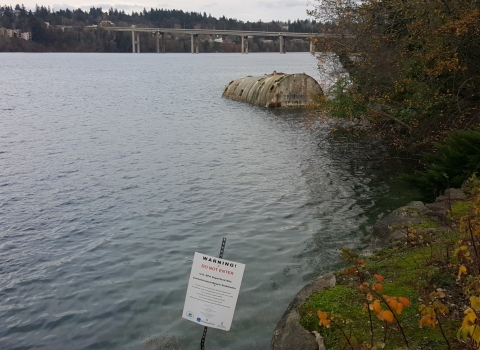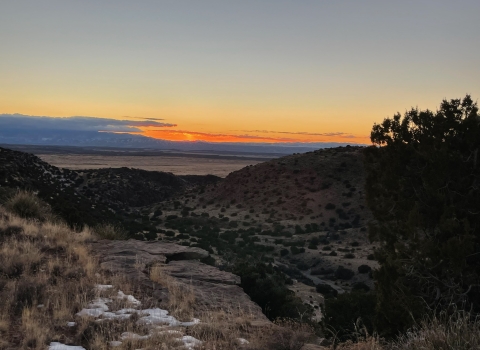The U.S. Fish and Wildlife Service today announced it is implementing a pilot program at seven National Wildlife Refuges during the Fall 2024 hunting season to test voluntary, incentive-based efforts to increase the use of lead-free ammunition by hunters on Service-administered lands. The best available science indicates lead ammunition and fishing tackle can have negative impacts on wildlife.
The Service developed the pilot program working with the Hunting and Wildlife Conservation Council, a federal advisory committee established by the Secretaries of the Department of the Interior and the Department of Agriculture, and state, non-governmental and industry partners. In December 2023, the HWCC recommended federal agencies pursue wildlife management approaches that encourage hunters to voluntarily switch from using lead ammunition to using lead-free ammunition as a non-regulatory means of addressing lead poisoning in wildlife on federal lands.
“The Service is committed to providing access to National Wildlife Refuges and also to minimizing the impacts to wildlife from lead exposure,” said Service Director Martha Williams. “This pilot program and the lessons learned will be critically important in determining our best approach to managing lead use by outdoor recreationists on refuge lands and waters.”
The Service, in collaboration with the HWCC and with the respective state wildlife agencies, has identified the following sites to pilot voluntary, incentive-based lead-free hunting opportunities for Fall 2024:
- Patoka River NWR in Indiana – Deer hunting
- Blackwater NWR in Maryland – Deer hunting
- Wallkill River NWR in New Jersey – Hunting for all species
- Pocosin Lakes NWR in North Carolina – Deer hunting
- William L. Finley NWR in Oregon – Elk hunting
- Canaan Valley NWR in West Virginia – Hunting for all species
- Trempealeau NWR in Wisconsin – Deer hunting
The Service will implement a rebate program in each of these refuges for hunters who voluntarily choose to use lead-free ammunition. This includes prepaid debit cards for reimbursement of the cost of lead-free ammunition with proof of purchase and other refuge specific economic incentives. The Service will share refuge specific details as they are finalized. Additionally, a monitoring component will seek to determine program impacts so more effective models for incentivizing the voluntary use of lead-free ammunition can be replicated to guide actions by the Service and other land and wildlife managers in addressing lead poisoning in wildlife. Similar efforts to promote the voluntary use of non-lead ammunition have been previously undertaken by conservation groups in collaboration with the states of Arizona, Utah and Oregon and other sporting groups.
The Service is engaged in a deliberate, transparent process of evaluating the future of lead use on Service lands and waters, working with state partners and seeking input from other stakeholders, including the HWCC, and the public.
The U.S. Fish and Wildlife Service works with others to conserve, protect and enhance fish, wildlife, plants and their habitats for the continuing benefit of the American people. For more information, visitwww.fws.gov, or connect with us through any of these social media channels: Facebook, Instagram, X (formerly known as Twitter), LinkedIn, YouTube and Flickr.
-FWS-
WHAT THEY ARE SAYING
“We commend the Service for its willingness to work in collaboration with the Council to implement a new and, we hope, durable solution to increasing the use of lead-free ammunition by the hunting public on federal lands and reducing the incidence of lead poisoning in wildlife,” said John Devney, Chair of the Hunting and Wildlife Conservation Council. “The Council recommends a voluntary, incentive-based approach and believes it may prove to be more effective than a regulatory approach.”
“The Association of Fish and Wildlife Agencies appreciates the Service’s commitment to exploring a voluntary and non-regulatory approach to the use of non-lead ammunition on National Wildlife Refuges,” said Chuck Sykes, Director of the Alabama Division of Wildlife and Freshwater Fisheries and President of the Association. “Continued communication and engagement with the state wildlife agencies where the pilots will be conducted will be critical to the success of the effort.”
“As a member of the Hunting and Wildlife Conservation Council, we appreciate the Fish and Wildlife Service launching a process where hunters can make their own determination as to what type of ammunition they prefer while afield through voluntary, non-regulatory approaches,” said Congressional Sportsmen’s Foundation President and CEO Jeff Crane.
“Voluntary incentives and public education continue to represent the most effective approach to convince hunters to use non-lead ammunition,” said Becky Humphries, interim CEO of the Theodore Roosevelt Conservation Partnership. “TRCP appreciates the U.S. Fish and Wildlife Service working with the Hunting and Wildlife Conservation Council to launch a pilot program during the fall hunting season to incentivize the voluntary use of non-lead ammunition at seven National Wildlife Refuges.”
“The effort to create and implement the Service’s lead-free pilot project is an example of collaboration with a capital “C” between the Service, HWCC, and state agencies,” said Land Tawney, HWCC member & Wildlife Health Subcommittee Chair. “Together we forged a path forward to address a challenging issue in both a responsible and durable manner. I look forward to seeing the Council’s recommendations implemented this fall and beyond.”
“The pilot program announced today is the right approach to a contentious and complicated issue. It is, in fact, the best approach. I am gratified that the Council, the FWS, and many conservation groups have developed and adopted it. Promoting non-lead alternatives and learning how hunters can best adopt them will most effectively address remaining concerns about lead,” said Simon Roosevelt, Policy Vice President - Boone & Crockett Club and Hunting and Wildlife Conservation Council Alternate Member.
“The Wildlife Society supports educational efforts, policies and regulations by fish and wildlife agencies that reduce wildlife exposure to lead from hunting and fishing tackle,” said Ed Arnett, CEO of The Wildlife Society. “We encourage the voluntary replacement of lead-based hunting ammunition and fishing tackle, and the pilot incentive programs for lead-free hunting on National Wildlife Refuges announced by the U.S. Fish and Wildlife Service are a good step in this direction.”
“Over the past few decades, science has shown that lead ammunition and tackle can poison fish, birds, and other wildlife, an unintended and also unnecessary side effect of our hunting and fishing activities,” said Mike Leahy, senior director of wildlife, hunting, and fishing policy at the National Wildlife Federation. “The voluntary lead-free pilot program announced by the U.S. Fish and Wildlife Service at seven wildlife refuges will serve to educate hunters and anglers about the tremendous benefits of switching to any of the many effective and increasingly affordable lead-free ammunition and tackle products offered by the shooting sports and fishing industries.”



